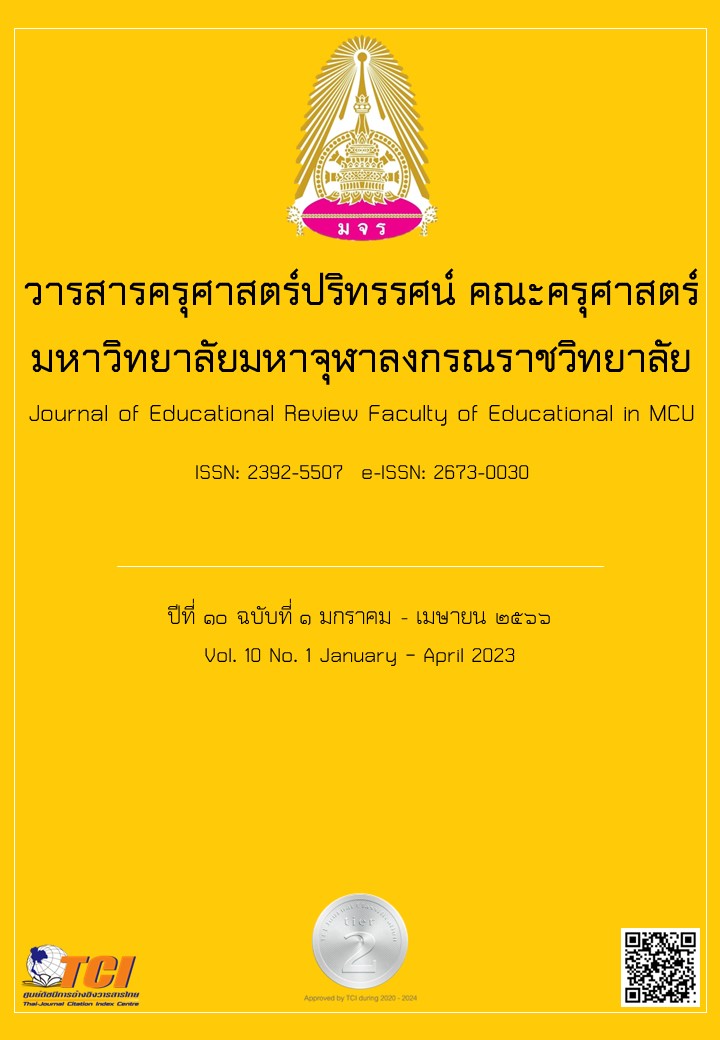THE MODEL OF THE EDUCATIONAL QUALITY DEVELOPMENT THROUGH DEVELOPMENTAL EVALUATION SUITABLE FOR EDUCATIONAL INSTITUTIONS UNDER THE LOCAL GOVERNMENT ORGANIZATION AS NETWORK OF YAWAPAT CENTERS, STATESMAN FOUNDATION
Main Article Content
Abstract
The purpose of this research was to develop a model for improving education quality using developmental evaluation (DE) suitable for schools under local administrative organizations, Yavapat Center Network, Statesman Foundation by using mixed quantitative with qualitative method 3 stages: 1) studying the factors that promote the development of education quality by using developmental evaluation of schools under local administrative organizations, Yavapat Center Network, Statesman Foundation. 2) creating a model for improving the education quality using developmental evaluation 3) evaluating the developed model. The samples for a quantitative method included school directors, head academic teacher, teacher, and chairman of the basic school totally 80 persons; and the key informants for a qualitative method is 7 experts who were specialist in developmental evaluation. Tools used to collect data consist of Questionnaire, Semi-structured interview, Participant observation record, In-deep interview and Model assessment form. Data were analyzed using basic statistics, and content analysis. The research results were as follows: 1) The factors that promote the development of education quality of schools under local administrative organizations. The top three in this area are management processes, learning management process, and environment and service. 2) The model for improving education quality has 5 components: 1) jointly targeting development, 2) analyzing complex issues that need to see change, 3) defining tools to put in place a system of work focused on utilization, 4) carrying out team development and target audiences, 5) evaluating to adjust the plan and developing in time. 3) Evaluation of the model indicated that after model trial mean significantly higher than before using the model at the .01 level.
Article Details

This work is licensed under a Creative Commons Attribution-NonCommercial-NoDerivatives 4.0 International License.
ทัศนะและความคิดเห็นที่ปรากฏในบทความในวารสารฉบับนี้ถือเป็นความรับผิดชอบของผู้เขียนบทความนั้นเพียงผู้เดียว และไม่ถือเป็นทัศนะและความรับผิดชอบของกองบรรณาธิการ
กองบรรณาธิการขอสงวนสิทธิ์ในการคัดเลือกบทความลงตีพิมพ์และจะแจ้งให้เจ้าของบทความทราบหลังจากผู้ประเมินบทความตรวจอ่านบทความแล้ว
ต้นฉบับที่ได้รับการตีพิมพ์ในวารสารครุศาสตร์ปริทรรศน์ คณะครุศาสตร์ มหาวิทยาลัยมหาจุฬาลงกรณราชวิทยาลัย ถือเป็นกรรมสิทธิ์ของคณะครุศาสตร์ มหาวิทยาลัยมหาจุฬาลงกรณราชวิทยาลัย ห้ามนำข้อความทั้งหมดหรือบางส่วนไปพิมพ์ซ้ำ เว้นเสียแต่ว่าจะได้รับอนุญาตจากมหาวิทยาลัยฯ เป็นลายลักษณ์อักษร
References
กฎกระทรวงการประกันคุณภาพการศึกษา. (2561). การประกันคุณภาพการศึกษา พ.ศ. 2561. ราชกิจจานุเบกษา เล่ม 135 ตอนที่ 11 ก (2 ก.พ. 2561).
ระบบข้อมูลกลางองค์กรปกครองส่วนท้องถิ่น. (2565). นวัตกรรมและการศึกษา. แหล่งที่มา https://info.dla.go.th/onepage/info02.jsp. สืบค้นเมื่อ 2 ก.พ. 2565.
วิจารณ์ พานิช. (2563). Developmental Evaluation สำคัญอย่างไร ทำไมครูต้องใช้พัฒนาระบบวัดประเมิน. แหล่งที่มา https://iamkru.com/2021/05/12/development-evaluation/. สืบค้นเมื่อ 5 ธ.ค. 2564.
สมาคมพนักงานเทศบาลแห่งประเทศไทย. (20 ก.ค. 2560). การจัดการท้องถิ่น. หนังสือพิมพ์สยามรัฐ สัปดาห์วิจารณ์. 64(44). (20 ก.ค. 2560).
สำนักทดสอบทางการศึกษา สำนักงานคณะกรรมการการศึกษาขั้นพื้นฐาน. (2559). คู่มือการประเมินคุณภาพตามมาตรฐานการศึกษาขั้นพื้นฐาน เพื่อการประกันคุณภาพภายในของสถานศึกษา. กรุงเทพมหานคร: สำนักงานพระพุทธศาสนาแห่งชาติ.
อิสระ กุลวุฒิ, สุรีพร อนุศาสนนันท์, และสมพงษ์ ปั้นหุ่น. (2563). รูปแบบการประเมินระหว่างเรียน. วารสารวิชาการ มหาวิทยาลัยราชภัฏบุรีรัมย์. 10(2). 21-33.
Alison Laycock, Bailie, J., Matthews, V. et al. (2019). Using developmental evaluation to support knowledge translation: reflections from a large-scale quality improvement project in Indigenous primary healthcare. Health Res Policy Sys. 17. 70.
Patton, M.Q. (2010). Developmental Evaluation. Applying Complexity Concepts to Enhance Innovation and Use. New Yoke: The Guilford Press.
Peter Senge. (2017). The iceberg model for guiding systemic thinking. From http://www.Socialincilico. wordpress.com Retrieved February 2, 2020.


